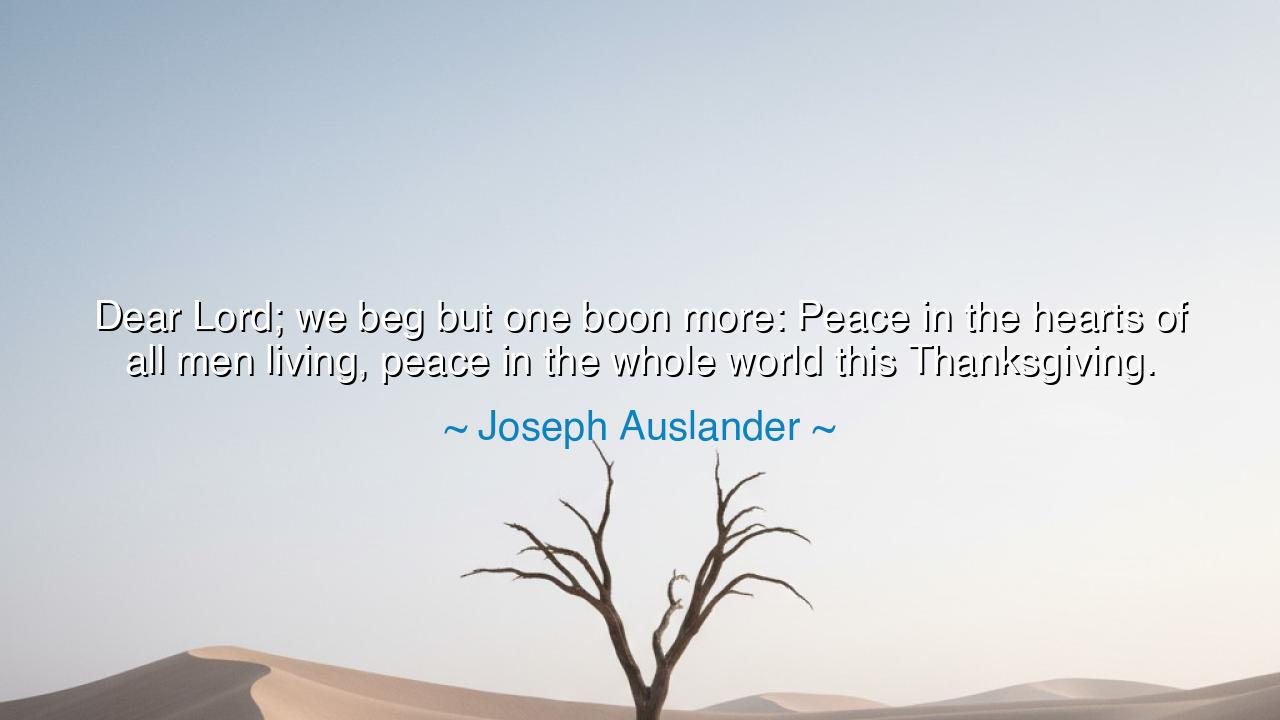
Dear Lord; we beg but one boon more: Peace in the hearts of all
Dear Lord; we beg but one boon more: Peace in the hearts of all men living, peace in the whole world this Thanksgiving.






"Dear Lord; we beg but one boon more: Peace in the hearts of all men living, peace in the whole world this Thanksgiving." With these words, Joseph Auslander, the first U.S. Poet Laureate, offers a prayer that rises above the table of food and enters into the throne room of eternity. He reminds us that beyond turkey and bread, beyond family and feasting, the truest desire of the human heart on Thanksgiving is not material plenty, but peace. For what is abundance without harmony? What is joy without unity? His plea is a cry for wholeness that reaches across the boundaries of time, touching every generation.
The origin of this prayer lies in the dark shadows of history. Auslander wrote during an era marked by war and unrest, when the world was torn by conflict and humanity seemed bent on self-destruction. In 1942, as flames of battle engulfed Europe and Asia, families in America still gathered for Thanksgiving. Yet even in their gratitude, they could not forget the cries of the world. Thus, Auslander’s words arose as both a prayer and a prophecy: that gratitude must not end with ourselves, but expand outward to encompass the yearning of the world for peace.
History gives us many echoes of this truth. During the First World War, soldiers from opposing sides famously laid down their weapons on Christmas Eve in 1914. For a single night, the battlefield was silent. Men who had been killing one another hours before now shared songs, bread, and laughter. This fragile moment of peace in the hearts of men showed the world that beneath politics and hatred, the human spirit longs for harmony. Auslander’s prayer is born of the same longing, asking that what flickers briefly might one day burn eternally.
There is a profound humility in his words: “we beg but one boon more.” He acknowledges that life has already given much—food, family, shelter—but pleads for the greatest gift of all: peace. This is no selfish prayer for personal gain, but a universal cry. In asking for peace, Auslander speaks for the widow and the soldier, the hungry and the rich, the child in safety and the child in danger. His prayer is a reminder that Thanksgiving is not complete if it is confined to one’s own household; it must reach beyond the table to embrace the world.
Yet peace, as Auslander knew, is not merely the absence of war. It is peace in the hearts of all men living. For without inner peace, no treaty, no ceasefire, no agreement can endure. True thanksgiving requires the cultivation of forgiveness, humility, and reconciliation within each soul. Only then can the outer world reflect the inner harmony of mankind. Thus, his words challenge us not only to pray for peace, but to live in such a way that peace begins with us.
The lesson for future generations is clear: gratitude must give birth to responsibility. It is not enough to feast and to thank; we must also commit ourselves to be instruments of peace. The bread we break must remind us of the bonds we share with all humanity. The cup we raise must call us to heal division. Auslander’s prayer teaches that the true measure of Thanksgiving is not in the fullness of the stomach, but in the fullness of the heart toward others.
Practical action flows naturally from this vision. At every Thanksgiving table, let there be a moment of prayer not only for our families but for the world. Teach children to connect gratitude with compassion, and feasting with service. Seek reconciliation where there is conflict; give generously to those in need; work for justice where there is oppression. In this way, peace will not be a distant dream, but a living reality, planted first in hearts and then blossoming in nations.
Thus, Joseph Auslander’s words resound like an ancient hymn: peace is the greatest boon. Without it, gratitude falters; with it, even the smallest meal becomes a banquet. This Thanksgiving, let us remember that the holiday is not only about celebrating what we have, but about yearning for what all humanity needs—peace in the heart, peace in the home, peace in the world.






AAdministratorAdministrator
Welcome, honored guests. Please leave a comment, we will respond soon